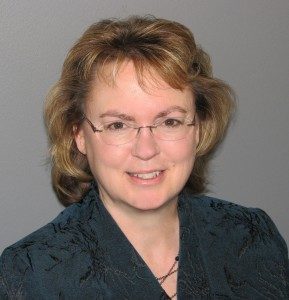The Department of Biochemistry and Molecular Biology baton has been passed into the hands of Professor Laurie Stargell, who is ready to go full speed ahead as the new chair of that department in Colorado State University’s College of Natural Sciences.

Stargell strives to continue her mentoring, to grow and strengthen her department ranks, and to develop new programs and ideas. But these are just the start to her plans as department chair. She said, “I feel strongly that we should empower our people, whether they be faculty, staff or students, with the knowledge and skills they need to succeed.”
Early exploration
Stargell earned her B.A. in biology at the University of Virginia in 1986. She then went on to become a pre-doctoral fellow at the University of Rochester, where she received her Ph.D. in biology. There, she began studying basic machinery for RNA polymerase II transcription. This led into her research with chromatin, histone variants, and transcription processes in the model organism Tetrahymena.
After completing her studies at Rochester, Stargell began her postdoctoral research in genetics at Harvard Medical School and finished in 1996. As a postdoctoral fellow, she became fascinated by the power and breadth of approaches available in the yeast system for understanding mechanisms of transcriptional regulation, which she continues to make headway on today.
Trail of success
Stargell has been a part of CSU for the past 20 years and is committed to mentoring and providing research opportunities for students at all levels. She started out as an assistant professor in 1996, and moved up to associate professor in 2002. She has been the associate chair for undergraduate studies since 2006 and is involved in creating curriculum, advising, and helping with the scholarship processes for the growing undergrad population in biochemistry and molecular biology.
In 2008, she became a full professor in the Department of Biochemistry and Molecular Biology and continues to teach introduction to genetics, molecular genetics, a biochemistry seminar, and molecular biology. Thanks to her research and her ability to mentor at CSU, past students have reached career goals and now hold positions in academia and in the field.
She is also the chair of the board of directors for the Institute of Genome Architecture and Function. She has received honors from CSU such as the Jack E. Cermak Advising Award, CNS Professor Laureate, and Oliver P. Pennock Distinguished Service Award. She was also awarded, along with fellow CSU professor Jennifer Nyborg and former CSU professor Karolin Luger, a $7.8 million grant from the National Institutes of Health to study how chromosomes unravel to depict genes that dictate cell behavior.
Stargell also started an elementary outreach program along with fellow CSU Associate Professor Eric Ross, to get young students excited about science. Biochemistry is Elementary, is an eight-week-long program that has engaged over 600 fifth graders. It allows students to get hands on experience introducing genetics and biochemistry, while showing the value of studying model systems.
Upholding the legacy
With a new chair being filled, the department looks ahead to keep research and advancement growing in the Department of Biochemistry and Molecular Biology under new chair, Laurie Stargell.
The College of Natural Sciences extends its gratitude to Shing Ho who has been the department’s chair for the last 10 years. As he returns to his faculty position, the department appreciates the progress he made during his time as chair. Biochemistry and molecular biology is now the fourth largest major in the college. And as of 2016, the entering class was 130, pushing majors to over 300 students. What’s more, its faculty continue to produce groundbreaking research.
Stargell sees her role as continuing this success. She said, “Each member of our department, whether faculty, staff, or student, is important and essential, and together we are responsible for the overall health and welfare of the department.”